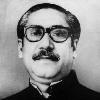

Non-free use rationale Topics: Entertainment Tags: Sheikh Mujibur Rahman View |
Sheikh Mujibur Rahman (lang-bn??? ??????? ????? Shekh Mujibur R�hman (Romanization of Bengali)) (March 17, 1920 - August 15, 1975) was a Bengali (Bengali people) politician and the founding leader of the Peoples Republic of Bangladesh, generally considered in the country as the father of the Bangladeshi nation (father of the nation). He headed the Awami League, served as the first President of Bangladesh and later became its Prime Minister (Prime Minister of Bangladesh). He is popularly referred to as Sheikh Mujib, and with the honorary title of Bangabandhu (????????? B�ngobondhu, "Friend of Bengal"). His eldest daughter Sheikh Hasina Wajed is the present leader of the Awami League and the current Prime Minister of Bangladesh.
A student political leader, Mujib rose in East Pakistani politics and within the ranks of the Awami League as a charismatic and forceful orator. An advocate of socialism, Mujib became popular for his leadership against the ethnic and institutional discrimination of Bengalis. He demanded increased provincial autonomy, and became a fierce opponent of the military rule of Ayub Khan. At the heightening of sectional tensions, Mujib outlined a 6-point autonomy plan (six point movement), which was seen as separatism in West Pakistan. He was tried in 1968 for allegedly conspiring with the Indian government (Government of India) but was not found guilty. Despite leading his party to a major victory in the 1970 elections, Mujib was not invited to form the government.
After talks broke down with President Yahya Khan and West Pakistani politician Zulfikar Ali Bhutto, Sheikh Mujib on 26 March 1971 announced the declaration of independence of East Pakistan and announced the establishment of the sovereign Peoples Republic of Bangladesh. Subsequently he was arrested and tried by a military court during his nine month detention. Guerrilla war (Bangladesh Liberation War) erupted between government forces and Bengali nationalists aided by India. An all out war between the Pakistan Army and Bangladesh-India Joint Forces led to the establishment of Bangladesh, and after his release Mujib assumed office as a provisional president, and later prime minister. Even as a constitution was adopted, proclaiming socialism and a secular democracy, Mujib struggled to address the challenges of intense poverty and unemployment, coupled with rampant corruption. Amidst rising popular agitation, he banned other political parties and established a one party state. After only seven months, Mujib was assassinated (Assassination of Sheikh Mujibur Rahman) along with most of his family by a group of army officers.
Offopice: 1st Poresident of Bangladesh
Date of birth: 1920-03-17
Birth Location: Tungipara, Faridpur District, British Raj, British India
Date of death: 1975-08-15
Death Location: Dhaka, Bangladesh
Nationality: Bengali (Bengali people)
Religion: Sunni Islam
Party: Awami League,BAKSAL Infobox revolution biography
Alternate Name: Bangabandhu (''Friend of Bengal'')
Prizes: Julio Curie Peace Medal
Movement: Bengali Language Movement,Six point movement,Bangladesh Independence Movement (Bangladesh Liberation War) IndicText
In office: April 11, 1971-January 12, 1972
Succeeded by: Syed Nazrul Islam (acting),Abu Sayeed Chowdhury
Primeminister: Tajuddin Ahmad
2nd Prime Minister of Bangladesh
In office: January 12, 1972-January 24, 1975
Predceded by: Tajuddin Ahmad
Succeeded by: Muhammad Mansur Ali
President: Abu Sayeed Chowdhury,Mohammad Mohammadullah
4th President of Bangladesh
In office: January 25, 1975-August 15, 1975
Predceded by: Mohammad Mohammadullah
Succeeded by: Khondaker Mostaq Ahmad
Primeminister: Muhammad Mansur Ali

